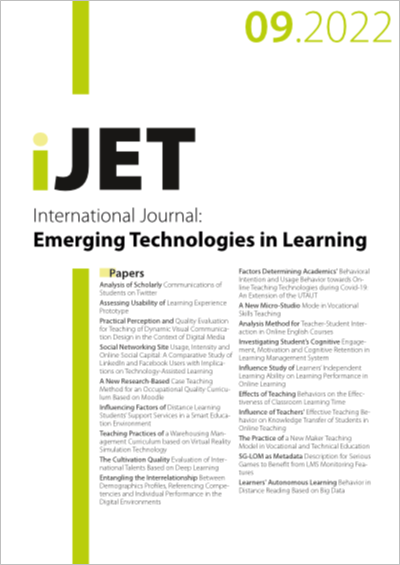Effects of Teaching Behaviors on the Effectiveness of Classroom Learning Time
DOI:
https://doi.org/10.3991/ijet.v17i09.30943Keywords:
vocational and technical college, teaching behavior, classroom learning time, effectivenessAbstract
Vocational and technical higher education in China has made great progress. However, classroom learning inefficiency is still observed. Based on the composition theory of classroom instructional time and the characteristics of classroom teaching in vocational and technical colleges, evaluation indexes of the effectiveness of classroom learning time were proposed in this study, and the effects of teaching behaviors on the effectiveness of the classroom learning time were analyzed through the observation on teaching behaviors and learning efficiency. Using the classroom teaching of "equivalence calculation in engineering economy" in a vocational and technical college in Chongqing, China as the subject, the classroom observation results were given, while the effects of frequency, cumulative time and the essence of teaching behaviors on the average value of learning time effectiveness (AEVp) and learning effectiveness per unit time (EV) were analyzed. Results show that the longer the time spent on a teaching behavior, the greater the AEVp would be, while EV differs, and "questioning"-typed teaching behaviors usually had positive effects on EV. Results indicate that the conversion of reasonable intervals between teaching behaviors helps to improve EV, and arrangement of personalized learning tasks and the strategies of answering questions need to be taken seriously. This study revealed the relationship between teaching behaviors and the effectiveness of classroom learning time, which may provide the evidence for optimizing instructional design and provide a path to fulfill the personalized learning needs.
Downloads
Published
How to Cite
Issue
Section
License
Copyright (c) 2022 Wei Zhang, Shiyuan Gan, Huagang He, Shengping Zhou

This work is licensed under a Creative Commons Attribution 4.0 International License.



